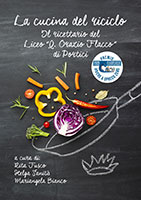The “Mediterranean diet”, thanks to the pioneering studies of Ancel Keys, in 2010 was declared an “intangible heritage of humanity” by UNESCO. This created a renewed interest for the people of the South of Italy and this aspect of their culture, which led to a new, complex perspective on something that seemed a simple aspect of daily life.
Research centers and universities were the protagonists of this interest.
These pages present the pilot experience of the Liceo “Q.O. Flacco ”of Portici, led by researchers from MedEatResearch, thanks to which girls and boys discovered the complexity of their own daily activities as well as their families’ daily gestures.
In the education field (in schools) food is part of the discourse almost exclusively in relation to “fighting obesity”. Very worthy indeed, but a partial effort. We went beyond the important purpose of food education, starting a historical and anthropological, and therefore cultural, consideration of the Mediterranean diet in order to stimulate a reflection on identity.
The high school students of “Q. O. Flacco” school were co-protagonists of the design of this learning environment, organized as a small community of practices in which students (apprentices), external experts (MedEatReserch researchers), teachers (mediators) and families were collaborative and integrated. It was a small community whose efforts shared a common objective.
This encounter between university and scholastic institutions allowed us to aim high, as we wanted to shine a light on food and its long way from unaware tradition to the formation of an active citizen.
The projects have become part of the educational path, in a disciplinary and evaluative perspective.
The experience allowed the students to become sort of “anthropologists of themselves” and to become aware of the historicity of their everyday life, of the deep and hidden value of gestures and knowledge usually taken for granted, of widening their horizon from the plate to the environmental horizon in which they are immersed. Food consciousness and ecological awareness have co-evolved along the way.
As in any practice-oriented community, it was the productive disobedience of the apprentices, or responsible creativity, that also produced unexpected and original results.
Together with the MedEatResearch researchers and their teachers, the students produced diverse materials that gave life to the Granary Junior Archive of the Mediterranean as a final product.
Project # 1
School/Work Alternating Project
I.I.S. “Quinto Orazio Flacco” – Portici (NA)
School Year 2016/2017
The cuisine of recycling. Good practices: reusing food leftovers:
Internal Tutor Professor Lisa Giordano
Class III/L Human Sciences Specialization
Project # 2
School/Work Alternating Project
I.I.S. “Quinto Orazio Flacco” – Portici (NA)
School Year 2017/2018
Legumes and community bonds: from the Pythagoras fava beans to the Maghreb restaurant around the corner. Cultural contamination, and more:
Internal Tutor Professor Daniela Molino
Class IV/L Human Sciences Specialization
Project # 3
School/Work Alternating Project
I.I.S. “Quinto Orazio Flacco” – Portici (NA)
School Year 2018/2019
Mediterranean diet. Myth and history of a lifestyle:
Internal Tutor Professor Giuseppe Coppola
Class V/L Human Sciences Specialization
Final products

Presentazione delle esperienze:
Video: sezione interviste
Quantitative survey about the eating habits of the
students of the “Q. O. Flacco “(EDU TEST) with results:


